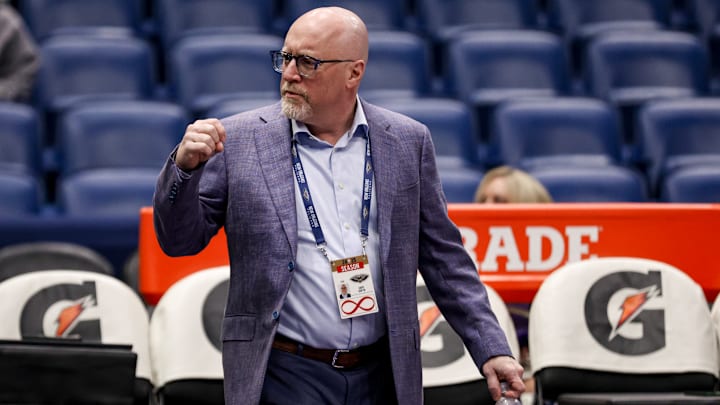The New Orleans Pelicans and their ownership group have wasted no time. The very next day after they officially wrapped up their 21-61 2024-25 NBA season with a final 100-115 loss to the Oklahoma City Thunder, the franchise announced that they had parted ways with Executive Vice President of Basketball Operations David Griffin.
Griffin was first hired by New Orleans back in 2019, tasking him with overseeing the conclusion of Anthony Davis's trade demand. A month after he was onboarded, the Pelicans drew the number one pick for the upcoming draft in the lottery, guaranteeing them the rights to consensus top prospect Zion Williamson. As a result, Griffin began his tenure in New Orleans with a massive headstart courtesy of a bonafide cornerstone in Zion as well as a major trade asset in AD
Fast forward nearly six years later, and the Pelicans are headed back to the NBA Draft lottery, with the future of their franchise heavily reliant on the results. From a macro view, New Orleans' 21-61 record six years into a rebuild around a generational star in Williamson is a perfectly fine summation of why David Griffin was fired. However, it's important to zoom in and really dissect what went wrong during his tenure, which reveals Griff's most fatal flaw that held back the Pelicans for years and ultimately cost him his job: indecision.
David Griffin's hesitance cost him his job and made it easier for the Pelicans to show him the door
This past season, David Griffin got one thing right for New Orleans: trading away Brandon Ingram. That deal neatly encapsulates Griff's approach as the top shot-caller for the Pels and why he and his teams repeatedly fell short. For years, it was clear that BI and Zion were a suboptimal pairing. While both players were undeniably talented and among the most prolific scorers in the NBA, their overlapping strengths and weaknesses were glaring. It was obvious to anyone paying attention that neither Ingram nor Williamson could be their best selves while sharing the floor with the other, and, as a result, the Pelicans could never be a legitimate contender so long as they were built around such an underwhelming star duo.
Still, David Griffin held onto Ingram tightly, even amid all the scrutiny, rumors, and even through some distastefully public contract disputes. Ultimately, he ended up trading BI this past season when he essentially had no other choice. Because of his hesitancy, Ingram's trade stock declined significantly over time. When Griffin finally moved him, Ingram was on an expiring contract, demanding a massive extension, and his limitations as a player became well known. As a result, the Pelicans only got back Kelly Olynyk, Bruce Brown Jr., one top-six protected future first-round pick, and a second-round selection in exchange for a career 20-point scorer and former All-Star in his prime.
This year, Griffin had the opportunity to do a lot more than just move off of Ingram. The Pelicans were reportedly considering a massive roster overhaul, after their entire rotation was marred by injuries and it became clear that they would be forced into tanking another season. New Orleans might have been having an awful season as a team, but they had plenty of excellent individual parts, including CJ McCollum, Dejounte Murray, Herb Jones, and even Zion Williamson, that could have collectively commanded a massive return that would have accelerated the Pelicans' rebuild, especially when factoring in their incoming lottery pick.
Instead, Griffin elected to do the bare minimum and passed the deadline after only dealing away Ingram and salary-dumping Daniel Theis. Had he embarked on a complete roster reset, there's a chance that the Pelicans' ownership would have wanted to keep him around to see through his vision (see: Nico Harrison and the Dallas Mavericks). Instead, he chose to hang onto his assets until the offseason. Now, those cards will be played by somebody else — hopefully, someone who won't be paralyzed by their own indecision at every turn.
